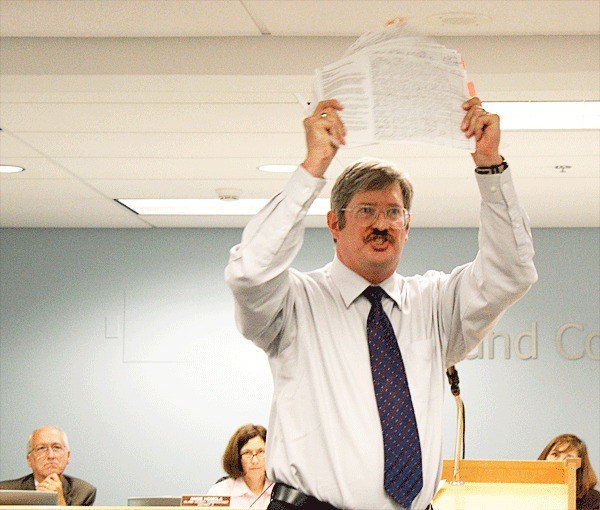Three dozen angry people complained to Island County commissioners Monday morning about plans to spend $20,000 on lawyers for a proposed clean water utility district, which would come with an associated tax on property.
The new tax would replace the much-hated $62 septic fee, but commissioners will clearly face opposition in the public process to come. Despite protests Monday, the three Democratic commissioners unanimously chose to hire the law firm — at a whopping $480 an hour for one of the two attorneys — and move forward with the process.
Commissioner John Dean said the attorneys will help the board create a proposal that is legal and that the commissioners can bring forward to the public with options, thus beginning the formal public process.
“We need to have a firm proposal that we can talk about,” he said.
The proposal to hire the lawyers was apparently significant enough to bring former Commissioner Mac McDowell back into county politics. In an email that’s been circulating around the county, McDowell advised fellow Republicans to attend the meeting and ask commissioners to take the item off the consent agenda, where it can be passed without discussion.
“Once they spend a large sum of money for the law firm to write it, I am almost 100 percent sure they will eventually pass it,” he wrote.
The long line of speakers followed McDowell’s suggestion and demanded that two related items be removed from the consent agenda and discussed separately, which the commissioners agreed to do.
Camano Island resident Kelly Emerson, a Republican challenging Commissioner John Dean in the November election, led the attack Monday by saying it was “disheartening” that the commissioners would spend the money on attorneys before discussing the proposal with the public. She argued that the citizens already sent a message by defeating Proposition 1, the property tax measure, in the primary by a wide margin.
“Stop the spending. No more taxes. Prioritize,” Emerson said.
Most of the other speakers, some of whom were clearly incensed, echoed her sentiments.
“How loud must we get before you realize how many of your constituents are angry about your blatant arrogance and disregard for them?” Coupeville resident Kenneth Wolf asked.
“We’ve got clean, clear water. This is just another Draconian way to take away people’s property rights,” Camano resident Terry Hardin said.
Karen Harden, president of the Central Whidbey Chamber of Commerce, was the only citizen to speak in favor of the clean water utility district. She urged the commissioners to reach out to the public so they understand that “not all spending is bad.”
“The only problem is everyone is afraid and they need to feel their opinions matter,” she said.
The creation of a clean water utility district is a way for counties and municipalities to fund projects to protect water resources. Island County Public Health Director Keith Higman explained that a past board of commissioners started discussing the possibility of creating such a district in 2005. Three years ago, for example, former Republican County Commissioner Mike Shelton argued in favor of a utility to fund the septic program.
The current commissioners considered a clean water utility in detail with department heads early this year. They originally discussed an annual fee in the neighborhood of $32 to $47 per parcel in unincorporated Island County; that would bring in from $1.3 million to $1.9 million a year from owners of the 40,000 parcels in the county.
The commissioners and department heads proposed using the tax to fund a number of water-protecting activities, including the county’s septic tank inspection program, a hydrogeologist, surface water monitoring, drainage construction outside of roadways, salmon recovery, shellfish protection, low-impact development coordination, watershed basin coordination and enforcement of the critical areas ordinance.
This summer, however, the commissioners agreed that the elements of programs should be phased in so that the fee would be more modest, given the current economic climate. But Dean said the details can’t be firmed up until they get legal help.
Public Works Director Bill Oakes explained at the meeting that he and other county officials did as much work as they could on the issue, but that the next step needed to done by lawyers.
Under the resolution, the commissioners hired the Seattle law firm Foster Pepper to draft the initial ordinance, code and fee structure to establish the utility, as well as provide legal advice to the commissioners. The contract was accepted without bids; Oakes pointed out that the firm is a well known for representing public agencies and has experience with establishing utility districts.
The contract states that the fees and charges shall not exceed $20,000 and is expected to take 52 hours of work. One of the attorneys will be paid $480 an hour and the other will make $385 an hour. The money will come from the public works fund, which isn’t part of the current expense fund the commissioners are in the process of cutting.
Commissioner Angie Homola pointed out that many counties already have clean water utility districts and that cities like Oak Harbor charge for stormwater management, which is essentially the same thing. In fact, she said Oak Harbor’s fees for stormwater have skyrocketed in recent years. In addition, she said the county is behind Oak Harbor, Coupeville and Whidbey Island Naval Air Station when it comes to managing stormwater, recycling, low-impact development and other environmental measures.
“We’re just trying to come on board with something minimal,” she said.
Commissioner Helen Price Johnson emphasized that everyone she spoke to about the hated $62 septic fee said they would like to see it replaced with something more equitable, like a clean water utility fee.
“I look forward to hearing from those folks again as we take it out to the public,” she said.




